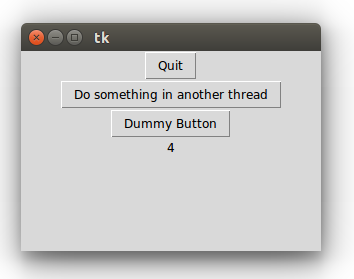#for Python 2
#import Tkinter as tk
#import ttk
#for Python 3
import tkinter as tk
from tkinter import ttk
import platform
def quit():
global tkTop
tkTop.destroy()
tkTop = tk.Tk()
tkTop.geometry('500x400')
tkLabelTop = tk.Label(tkTop, text=" http://hello-python.blogspot.com ")
tkLabelTop.pack()
strVersion = "running Python version " + platform.python_version()
tkLabelVersion = tk.Label(tkTop, text=strVersion)
tkLabelVersion.pack()
strPlatform = "Platform: " + platform.platform()
tkLabelPlatform = tk.Label(tkTop, text=strPlatform)
tkLabelPlatform.pack()
tkButtonQuit = tk.Button(
tkTop,
text="Quit",
command=quit)
tkButtonQuit.pack()
lf1 = ttk.LabelFrame(tkTop, text="LabelFrame 1")
lf1.pack(fill="x", expand="yes")
def rbCallback():
varLabel.set("Radiobutton clicked: " + str(rbVar.get()))
rbVar = tk.IntVar()
rb1 = tk.Radiobutton(
lf1,
text="One",
variable=rbVar,
value=1,
command=rbCallback)
rb1.pack(anchor=tk.W)
rb2 = tk.Radiobutton(
lf1,
text="Two",
variable=rbVar,
value=2,
command=rbCallback)
rb2.pack(anchor=tk.W)
rb3 = tk.Radiobutton(
lf1,
text="Three",
variable=rbVar,
value=3,
command=rbCallback)
rb3.pack(anchor=tk.W)
varLabel = tk.StringVar()
tkLabel = tk.Label(lf1, textvariable=varLabel)
tkLabel.pack()
lf2 = ttk.LabelFrame(tkTop, text="LabelFrame 2")
lf2.pack(fill="both", expand="yes")
def cb1Callback():
varLabel2.set("Checkbutton 1 clicked: " + str(cb1Var.get()))
cb1Var = tk.BooleanVar()
cb1 = tk.Checkbutton(
lf2,
text="Checkbutton 1",
width = 50,
background='#B0B0B0',
anchor=tk.W,
variable=cb1Var,
command=cb1Callback)
cb1.pack()
def cb2Callback():
varLabel2.set("Checkbutton 2 clicked: " + cb2Var.get())
cb2Var = tk.StringVar()
cb2 = tk.Checkbutton(
lf2,
text="Checkbutton 2 - ON/OFF",
width = 50,
background='#C0C0C0',
anchor=tk.W,
variable=cb2Var,
onvalue="ON",
offvalue="OFF",
command=cb2Callback)
cb2.pack()
varLabel2 = tk.StringVar()
tkLabel2 = tk.Label(lf2, textvariable=varLabel2)
tkLabel2.pack()
tk.mainloop()
Friday, December 18, 2015
Python Tkinter: ttk.LabelFrame
Labels:
code example,
tkinter
Python Tkinter: Radiobutton
Example to implement Radiobutton of Python Tkinter.
#for Python 2
#import Tkinter as tk
#for Python 3
import tkinter as tk
import platform
def quit():
global tkTop
tkTop.destroy()
tkTop = tk.Tk()
tkTop.geometry('500x300')
tkLabelTop = tk.Label(tkTop, text=" http://hello-python.blogspot.com ")
tkLabelTop.pack()
strVersion = "running Python version " + platform.python_version()
tkLabelVersion = tk.Label(tkTop, text=strVersion)
tkLabelVersion.pack()
strPlatform = "Platform: " + platform.platform()
tkLabelPlatform = tk.Label(tkTop, text=strPlatform)
tkLabelPlatform.pack()
tkButtonQuit = tk.Button(
tkTop,
text="Quit",
command=quit)
tkButtonQuit.pack()
def rbCallback():
varLabel.set("Radiobutton clicked: " + str(rbVar.get()))
rbVar = tk.IntVar()
rb1 = tk.Radiobutton(
tkTop,
text="One",
variable=rbVar,
value=1,
command=rbCallback)
rb1.pack(anchor=tk.W)
rb2 = tk.Radiobutton(
tkTop,
text="Two",
variable=rbVar,
value=2,
command=rbCallback)
rb2.pack(anchor=tk.W)
rb3 = tk.Radiobutton(
tkTop,
text="Three",
variable=rbVar,
value=3,
command=rbCallback)
rb3.pack(anchor=tk.W)
varLabel = tk.StringVar()
tkLabel = tk.Label(tkTop, textvariable=varLabel)
tkLabel.pack()
tk.mainloop()
Labels:
code example,
tkinter
Python Tkinter: Checkbutton
#for Python 2
#import Tkinter as tk
#for Python 3
import tkinter as tk
import platform
def quit():
global tkTop
tkTop.destroy()
tkTop = tk.Tk()
tkTop.geometry('500x300')
tkLabelTop = tk.Label(tkTop, text=" http://hello-python.blogspot.com ")
tkLabelTop.pack()
strVersion = "running Python version " + platform.python_version()
tkLabelVersion = tk.Label(tkTop, text=strVersion)
tkLabelVersion.pack()
strPlatform = "Platform: " + platform.platform()
tkLabelPlatform = tk.Label(tkTop, text=strPlatform)
tkLabelPlatform.pack()
tkButtonQuit = tk.Button(
tkTop,
text="Quit",
command=quit)
tkButtonQuit.pack()
def cb1Callback():
varLabel.set("Checkbutton 1 clicked: " + str(cb1Var.get()))
cb1Var = tk.BooleanVar()
cb1 = tk.Checkbutton(
tkTop,
text="Checkbutton 1",
width = 50,
background='#B0B0B0',
anchor=tk.W,
variable=cb1Var,
command=cb1Callback)
cb1.pack()
def cb2Callback():
varLabel.set("Checkbutton 2 clicked: " + cb2Var.get())
cb2Var = tk.StringVar()
cb2 = tk.Checkbutton(
tkTop,
text="Checkbutton 2 - ON/OFF",
width = 50,
background='#C0C0C0',
anchor=tk.W,
variable=cb2Var,
onvalue="ON",
offvalue="OFF",
command=cb2Callback)
cb2.pack()
varLabel = tk.StringVar()
tkLabel = tk.Label(tkTop, textvariable=varLabel)
tkLabel.pack()
tk.mainloop()
Labels:
code example,
tkinter
Thursday, December 17, 2015
Python example: Implement Tab using ttk.Notebook
Python example to implement Tab using ttk.Notebook.
#for Python 2
import Tkinter as tk
import ttk
#for Python 3
#import tkinter as tk
#from tkinter import ttk
import platform
def quit():
global tkTop
tkTop.destroy()
tkTop = tk.Tk()
tkTop.geometry('500x300')
tkLabelTop = tk.Label(tkTop, text=" http://hello-python.blogspot.com ")
tkLabelTop.pack()
notebook = ttk.Notebook(tkTop)
frame1 = ttk.Frame(notebook)
frame2 = ttk.Frame(notebook)
notebook.add(frame1, text='Frame One')
notebook.add(frame2, text='Frame Two')
notebook.pack()
tkButtonQuit = tk.Button(
tkTop,
text="Quit",
command=quit)
tkButtonQuit.pack()
tkDummyButton = tk.Button(
frame1,
text="Dummy Button")
tkDummyButton.pack()
tkLabel = tk.Label(frame1, text=" Hello Python!")
tkLabel.pack()
strVersion = "running Python version " + platform.python_version()
tkLabelVersion = tk.Label(frame2, text=strVersion)
tkLabelVersion.pack()
strPlatform = "Platform: " + platform.platform()
tkLabelPlatform = tk.Label(frame2, text=strPlatform)
tkLabelPlatform.pack()
tk.mainloop()
Labels:
code example,
tkinter
Wednesday, December 16, 2015
Python example of using Thread
It's a simple Python example to run code in background thread, to keep GUI responsive.
#tkinter for Python 3.x
#Tkinter for Python 2.x
import tkinter
from threading import Thread
import time
def quit():
global tkTop
tkTop.destroy()
def doSomething():
print("Do something")
for count in range(5):
time.sleep(1)
varLabel.set(str(count))
def runThread():
varLabel.set("runThread() called")
myThread = Thread(target=doSomething)
myThread.start()
tkTop = tkinter.Tk()
tkTop.geometry('300x200')
tkButtonQuit = tkinter.Button(
tkTop,
text="Quit",
command=quit)
tkButtonQuit.pack()
tkButtonRunThread = tkinter.Button(
tkTop,
text="Do something in another thread",
command=runThread)
tkButtonRunThread.pack()
tkDummyButton = tkinter.Button(
tkTop,
text="Dummy Button")
tkDummyButton.pack()
varLabel = tkinter.StringVar()
tkLabel = tkinter.Label(textvariable=varLabel)
tkLabel.pack()
tkinter.mainloop()

Labels:
code example,
Thread,
tkinter
Subscribe to:
Comments (Atom)



